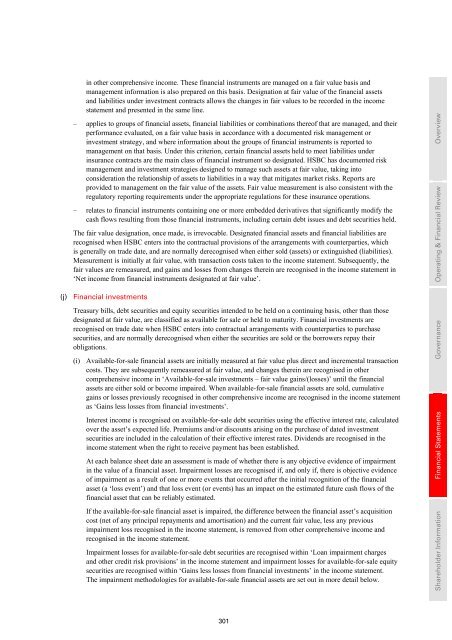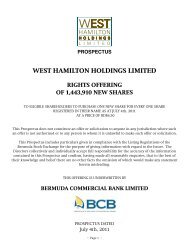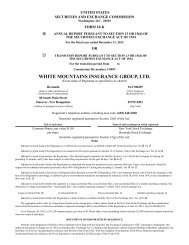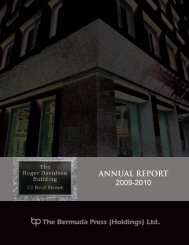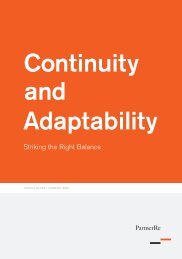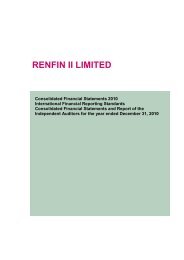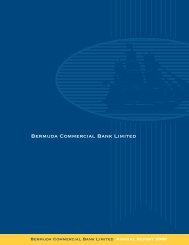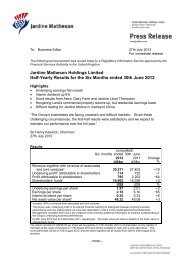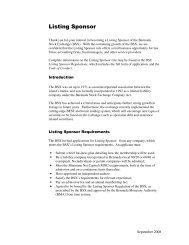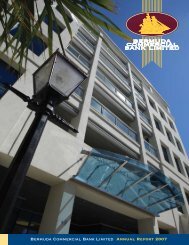Annual Report and Accounts 2011 - Bermuda Stock Exchange
Annual Report and Accounts 2011 - Bermuda Stock Exchange
Annual Report and Accounts 2011 - Bermuda Stock Exchange
Create successful ePaper yourself
Turn your PDF publications into a flip-book with our unique Google optimized e-Paper software.
in other comprehensive income. These financial instruments are managed on a fair value basis <strong>and</strong><br />
management information is also prepared on this basis. Designation at fair value of the financial assets<br />
<strong>and</strong> liabilities under investment contracts allows the changes in fair values to be recorded in the income<br />
statement <strong>and</strong> presented in the same line.<br />
– applies to groups of financial assets, financial liabilities or combinations thereof that are managed, <strong>and</strong> their<br />
performance evaluated, on a fair value basis in accordance with a documented risk management or<br />
investment strategy, <strong>and</strong> where information about the groups of financial instruments is reported to<br />
management on that basis. Under this criterion, certain financial assets held to meet liabilities under<br />
insurance contracts are the main class of financial instrument so designated. HSBC has documented risk<br />
management <strong>and</strong> investment strategies designed to manage such assets at fair value, taking into<br />
consideration the relationship of assets to liabilities in a way that mitigates market risks. <strong>Report</strong>s are<br />
provided to management on the fair value of the assets. Fair value measurement is also consistent with the<br />
regulatory reporting requirements under the appropriate regulations for these insurance operations.<br />
– relates to financial instruments containing one or more embedded derivatives that significantly modify the<br />
cash flows resulting from those financial instruments, including certain debt issues <strong>and</strong> debt securities held.<br />
The fair value designation, once made, is irrevocable. Designated financial assets <strong>and</strong> financial liabilities are<br />
recognised when HSBC enters into the contractual provisions of the arrangements with counterparties, which<br />
is generally on trade date, <strong>and</strong> are normally derecognised when either sold (assets) or extinguished (liabilities).<br />
Measurement is initially at fair value, with transaction costs taken to the income statement. Subsequently, the<br />
fair values are remeasured, <strong>and</strong> gains <strong>and</strong> losses from changes therein are recognised in the income statement in<br />
‘Net income from financial instruments designated at fair value’.<br />
Overview<br />
Operating & Financial Review<br />
(j) Financial investments<br />
Treasury bills, debt securities <strong>and</strong> equity securities intended to be held on a continuing basis, other than those<br />
designated at fair value, are classified as available for sale or held to maturity. Financial investments are<br />
recognised on trade date when HSBC enters into contractual arrangements with counterparties to purchase<br />
securities, <strong>and</strong> are normally derecognised when either the securities are sold or the borrowers repay their<br />
obligations.<br />
(i) Available-for-sale financial assets are initially measured at fair value plus direct <strong>and</strong> incremental transaction<br />
costs. They are subsequently remeasured at fair value, <strong>and</strong> changes therein are recognised in other<br />
comprehensive income in ‘Available-for-sale investments – fair value gains/(losses)’ until the financial<br />
assets are either sold or become impaired. When available-for-sale financial assets are sold, cumulative<br />
gains or losses previously recognised in other comprehensive income are recognised in the income statement<br />
as ‘Gains less losses from financial investments’.<br />
Interest income is recognised on available-for-sale debt securities using the effective interest rate, calculated<br />
over the asset’s expected life. Premiums <strong>and</strong>/or discounts arising on the purchase of dated investment<br />
securities are included in the calculation of their effective interest rates. Dividends are recognised in the<br />
income statement when the right to receive payment has been established.<br />
At each balance sheet date an assessment is made of whether there is any objective evidence of impairment<br />
in the value of a financial asset. Impairment losses are recognised if, <strong>and</strong> only if, there is objective evidence<br />
of impairment as a result of one or more events that occurred after the initial recognition of the financial<br />
asset (a ‘loss event’) <strong>and</strong> that loss event (or events) has an impact on the estimated future cash flows of the<br />
financial asset that can be reliably estimated.<br />
If the available-for-sale financial asset is impaired, the difference between the financial asset’s acquisition<br />
cost (net of any principal repayments <strong>and</strong> amortisation) <strong>and</strong> the current fair value, less any previous<br />
impairment loss recognised in the income statement, is removed from other comprehensive income <strong>and</strong><br />
recognised in the income statement.<br />
Impairment losses for available-for-sale debt securities are recognised within ‘Loan impairment charges<br />
<strong>and</strong> other credit risk provisions’ in the income statement <strong>and</strong> impairment losses for available-for-sale equity<br />
securities are recognised within ‘Gains less losses from financial investments’ in the income statement.<br />
The impairment methodologies for available-for-sale financial assets are set out in more detail below.<br />
Governance<br />
Financial Statements<br />
Shareholder Information<br />
301


